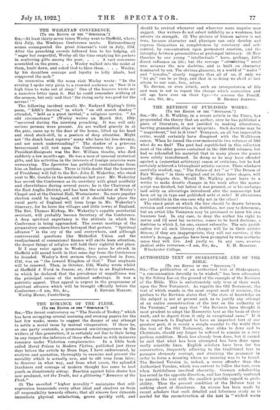THE ROMANCE OF THE FLESH.
[To THE EDITOR or TYE " Etracsasoas'] Sin,—The recent controversy on " The Novels of To-day," which has been occupying several morning and evening papers for the last few weeks, seems to suggest the danger of any attempt to settle a moral issue by mutual vituperation. If there be, as. one party contends, a pronounced sex-intemperance in the writers of this generation, it is certainly not due to their being in any Aspect the inferiors of those who dosed us with insincere romance under Victorian complacencies. In a little book called Moral Poison in Modern Fiction, published just three days before the article by Dean Inge, I have endeavoured, by analysis and quotation, thoroughly to examine and present the morality which is actually- new, and to sift true from false; to discover in what way, and from what cause, the splendid frankness and courage of modern thought has come to lead youth so disastrously astray. Reaction against false shame has now produced, not the Truth, but a glittering "Romance of the Flesh."
(1) The so-called "higher morality" maintains that self- expression transcends every other ideal and absolves us from all responsibility towards others; that all sincere love ddmands immediate physical satisfaction, grows quickly cold, and should be revived whenever and wherever mere impulse may suggest. Our writers do not admit infidelity as a weakness, but admire its strength. (2) The picture of human nature is not true, because character and physique can only develop and express themselves in completeness by constancy and self- control, by concentration upon permanent emotion, and the interplay between personalities of prolonged intimacy. (3) New theories by our young " intellectuals " have, perhaps, little direct influence on life; but the average " " novel now assumes the new doctrine, and is built on character dominated by sex. The obvious glamour, in a world of " males " and " females," clearly suggests that all of us, if only we "let go," can be as they, and that in so doing we shall at last attain to our real, free, selves.
To discuss, or even attack, such an interpretation of life and man is not to repeat the charge which convention and old age have ever on their lips :—to assume the Pontiff.


































 Previous page
Previous page